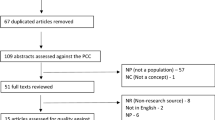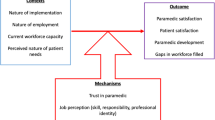Summary
Setting
Although patients should know the level of training of the physician providing their care in teaching hospitals, many do not.
Objective
The objective of this study is to determine whether the manner by which physicians introduce themselves to patients is associated with patients’ misperception of the level of training of their physician.
Patients/Participants
This was an observational study of 100 patient–physician interactions in a teaching emergency department.
Measurements and Main Results
Residents introduced themselves as a doctor 82% of the time but identified themselves as a resident only 7% of the time. While attending physicians introduced themselves as a “doctor” 64% of the time, only 6% identified themselves as the supervising physician. Patients felt it was very important to know their physicians’ level of training, but most did not.
Conclusions
Physicians in our sample were rarely specific about their level of training and role in patient care when introducing themselves to patients. This lack of communication may contribute to patients’ lack of knowledge regarding who is caring for them in a teaching hospital.

Similar content being viewed by others
References
The Council on Ethical and Judicial Affairs of the American Medical Association. Medical student’s involvement in patient care. J Clin Ethics. 2001;12:111–5.
The American College of Physicians. Ethics manual. Ann Intern Med. 1998;128:576–94.
Santen SA, Hemphill, Prough EE, Perlowski AA. Do patients understand their physicians’ level of training? A survey of emergency department patients. Acad Med. 2004;79:144–7.
Hemphill RR, Santen SA, Rountree CB, Szmit AR. Patients’ understanding of the roles of interns, residents, and attending physicians in the emergency department. Acad Emerg Med. 1999;6:339–44.
Joint Commission of Accreditation of Healthcare Organizations, Accreditation Manual for Hospitals. [monograph on line]. Oakbrook Terrace: Joint Commission Resource Inc.; 2002 [updated 2002 May 2, cited 2002 May 29]. Sections RI.1.2, MS 2.5 and 6.9.
Levinson W, Roter DL, Mullooly JP, Dull VT, Frankel RM. Physician–patient communication: the relationship with malpractice claims among primary care physicians and surgeons. JAMA. 1997;277:555–9.
Smith RC, Lyles JS, Mettler MA, et al.. A strategy for improving patient satisfaction by the intensive training of residents in psychosocial medicine: a controlled, randomized study. Acad Med. 1995;70:729–32.
Hall JA, Roter DL, Katz NR. Meta-analysis of correlates of provider behavior and medical encounters. Med Care. 1988;26:657–75.
Wendler DS, Shah S. How can medical training and informed consent be reconciled with volume outcome data. J Clin Ethics. 2006;17:149–57.
Lo B. Resolving Ethical Dilemmas, A Guide for Clinicians. 2nd ed. Philadelphia, PA: Lippincott Williams and Wilkins; 2000:19–28.
Hafferty FW, Franks R. The hidden curriculum, ethics teaching, and the structure of medical education. Acad Med. 1994;69:861–71.
Beatty ME, Lewis J. When students introduce themselves as doctors to patients. Acad Med. 1995;70:175–6.
Santen SA, Hemphill RR, Spanier CM, Fletcher N. “Sorry, it’s my first time!” Will patients consent to medical students learning procedures. Med Educ. 2005;39:365–9.
Williams CT, Fost N. Ethical considerations surrounding first time procedures: a study and analysis of patient attitudes toward spinal taps by students. Kennedy Inst Ethics J. 1992;2:217–31.
Santen SA, Hemphill RR, McDonald MF, Jo CO. Patient willingness to allow residents to learn to practice medical procedures. Acad Med. 2004;79:139–43.
Acknowledgements
There was no funding of this research. This paper was presented at ACEP Research Forum 2000, and the Southern Medical Association Annual Meeting 2000.
Conflict of Interest
None disclosed.
Author information
Authors and Affiliations
Corresponding author
Rights and permissions
About this article
Cite this article
Santen, S.A., Rotter, T.S. & Hemphill, R.R. Patients Do not Know the Level of Training of Their Doctors Because Doctors Do not Tell Them. J GEN INTERN MED 23, 607–610 (2008). https://doi.org/10.1007/s11606-007-0472-1
Received:
Revised:
Accepted:
Published:
Issue Date:
DOI: https://doi.org/10.1007/s11606-007-0472-1




